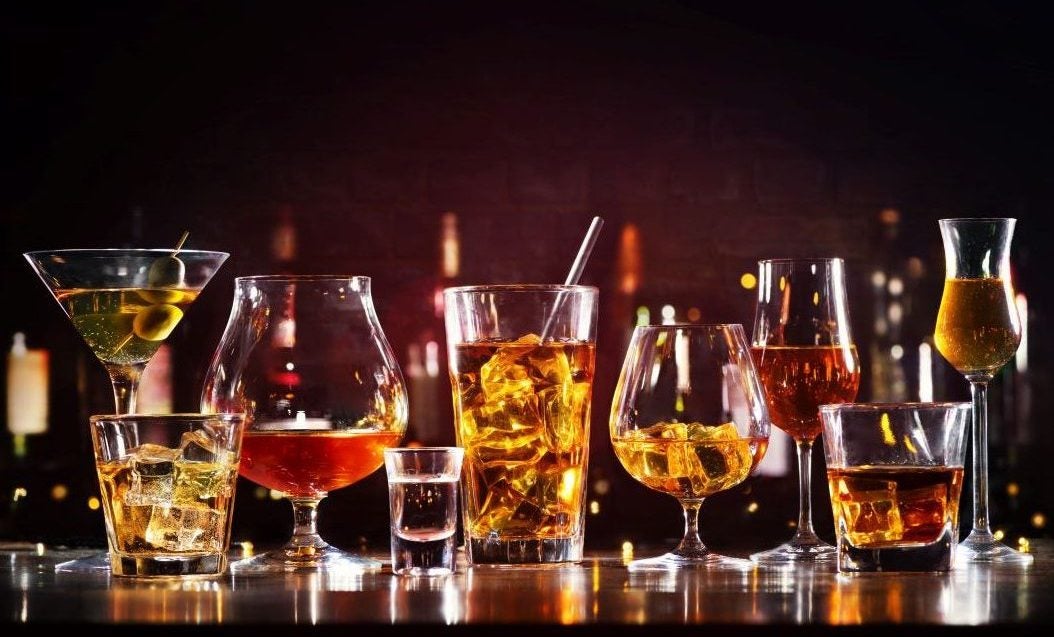
With the new year almost in sight, Just Drinks has spoken to a number of the global spirit sector’s figureheads on the opportunities and challenges they expect to face in the 12 months ahead.
From cost inflation and ESG issues to changing consumer behaviour and investment in AI, senior executives at Beam Suntory, Mast-Jägermeister, La Martiniquaise, Campari Group, Brown-Forman and Bacardi give their take on what 2024 might bring.
Mahesh Madhavan – Bacardi CEO
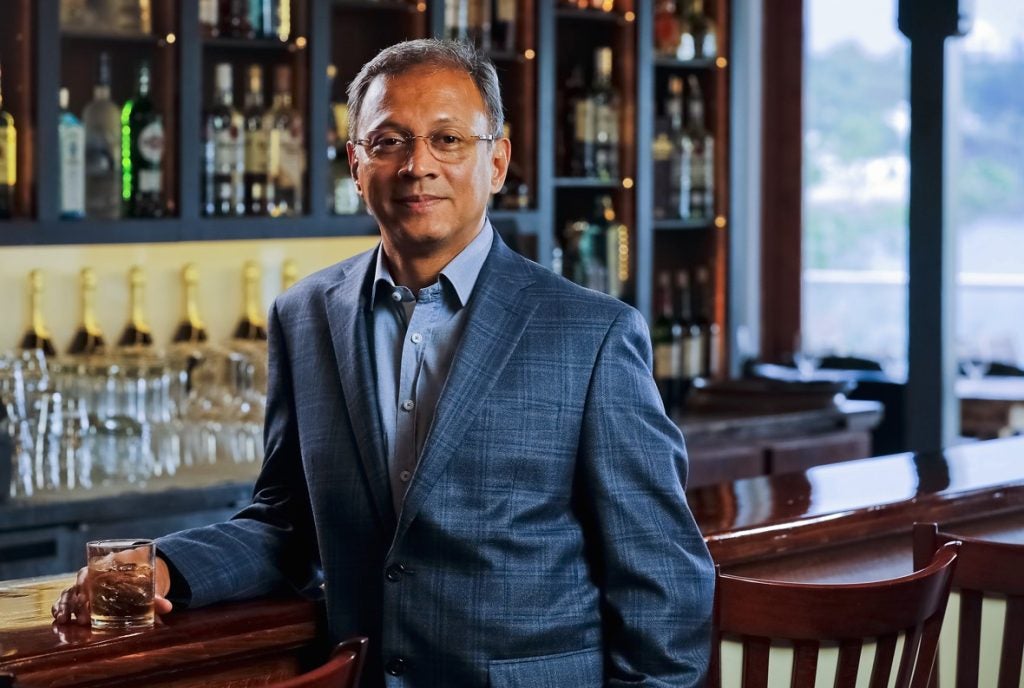
JD: What are Bacardi’s best opportunities for sales growth in 2024? Do you expect to see volume growth next year?
Mahesh Madhavan: The economic situation will hopefully improve in the second half of the year. Until we see that, consumers will be cutting back on their spending. However, premium spirits benefit from being an affordable luxury and consumers are continuing to treat themselves to international brands they know and love.
Whether it’s Tequila, Cognac, Scotch, Bourbon or Irish whiskey, these premium aged spirits are the big drivers of growth for the future.
JD: How do you think cost inflation will impact your business in the coming 12 months?
Madhavan: Clearly, a certain amount of deflation in the cost of goods started to take place in the latter half of 2023 and I would expect that to continue in the first half of 2024. To mitigate the impact of cost pressure, we are working closely with our suppliers to find ways and means to reduce the cost of goods.
JD: In which markets do you see the best opportunities for growth for Bacardi?
Madhavan: If you compare the premium share of spirits in the US versus Europe, there is still a lot of room for growth across European markets. In terms of growth over the longer term, Tequila is already on fire but from a small base. There is a lot more to come from Patron, and our recent acquisition of Ilegal, a super-premium artisanal mezcal, says everything about our firm belief in the future potential of agave.

US Tariffs are shifting - will you react or anticipate?
Don’t let policy changes catch you off guard. Stay proactive with real-time data and expert analysis.
By GlobalDataLooking ahead to the long term, big opportunities continue to lie in Asia, Africa, and Latin America, without a doubt.
JD: On which key ESG issues do you expect to increase investment in 2024 and why?
Madhavan: We set ourselves the goal of cutting all single-use plastic from our secondary packaging and point-of-sale materials from January 1, 2024. This is a big step towards our ultimate goal of being 100% plastic free by 2030. Achieving this goal will require significant new innovations, which is one area in which we are continuing to invest.
Just this month, we successfully completed the first commercial production run of a glass spirits bottle fueled by hydrogen. That innovation cut greenhouse gas emissions by more than 30%. We also ran a pilot programme with EcoSpirits and Carnival Cruise Line to introduce closed-loop packaging to the cruise industry.
JD: Do you have an optimistic outlook on the year to come?
Madhavan: I am a strong believer in the importance of positive thinking. From an economic perspective, 2024 is going to be slightly better than 2023. Consumers will have a little more money in their pockets to enjoy affordable luxuries and I am certain they will be flocking back to the on-trade as economies return to better health.
Michael Volke – Mast-Jägermeister CEO
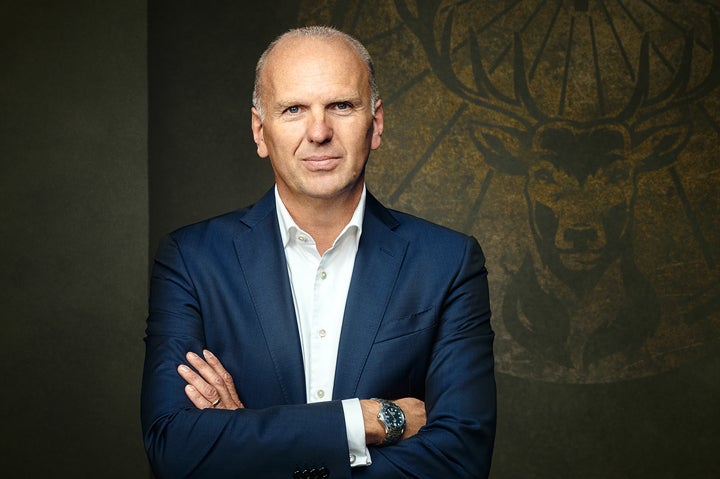
Just Drinks: Where do you see opportunities for sales growth in 2024?
Michael Volke: Expectations for short-term growth in premium-and-above spirits are on the conservative side due to the ongoing geopolitical disruptions and inflation, which are hitting consumers’ wallets. Consumer confidence is on a low and this affects the spirits industry as a whole. We remain cautiously optimistic about the outlook especially for the second half of 2024 due to a more positive outlook in the general consumer environment driven by lower inflation rates and stronger recovery in emerging markets. We think that both will be driving the return to normalised growth in premium spirits in the coming year.
JD: How do you think cost inflation will impact Mast-Jägermeister next year and what steps are you taking to mitigate the impact of that cost pressure?
Volke: We expect further cost inflation across our operational model in 2024. In an ongoing period of significant global economic, political, and social disruption, there are many challenges to our business. We have already taken some pricing adjustments in recent years to partially mitigate cost inflation. However, price elasticities are already very stretched. As a result, we see little to no room for further price measures in 2024.
JD: How do you see consumer demand across your geographic markets in 2024?
Volke: Looking ahead to 2024, we expect the market and consumer environment to remain fragile, but to show some recovery from the economic turbulence of recent years, especially in the second half. Quality and emotional values need to be reasonably in line in a competitive pricing environment. An unjustified premium will be refused.
It’s at times like these that we rely on our brand equity, something that we have invested heavily in over the years. As a predominantly on-trade brand with a mission to give consumers the best nights of their lives today and tomorrow, we expect that nights out with friends, celebrations and social drinking occasions will remain very relevant and when those moments do happen consumers will be seeking higher quality experiences. This is where we are primed to deliver.
Geographically we see the US returning to a normalized growth pattern and emerging markets will lead the development with an improving consumer confidence level.
JD: In which markets do you see the best opportunities for growth for your business?
Volke: We see great potential in emerging markets, particularly in regions such as Asia, the Middle East and Africa and eastern Europe. We are quite confident that these regions will be the main drivers for recovery in the premium spirits segment in 2024. We also envisage growth in global travel retail, as this channel regains traction after some exceptionally challenging years.
JD: What consumer trends do you expect to drive your innovation and NPD pipeline in the next twelve months?
Volke: Despite the economic environment, we see a continued trend towards premiumization and limited exclusive offerings. Additionally, flavour innovation will continue to be a trend with new, exciting variations coming to the market. This is something that we look forward to continuing to explore ourselves – interesting ingredients and flavor notes to complement the 56 herbs and botanicals that make up Jägermeister. We know that consumers are increasingly open to experimenting with new taste experiences – from unique and authentic flavour combinations, natural ingredients, or even the revival of traditional recipes with a modern twist.
Greg Hughes – Beam Suntory president and CEO
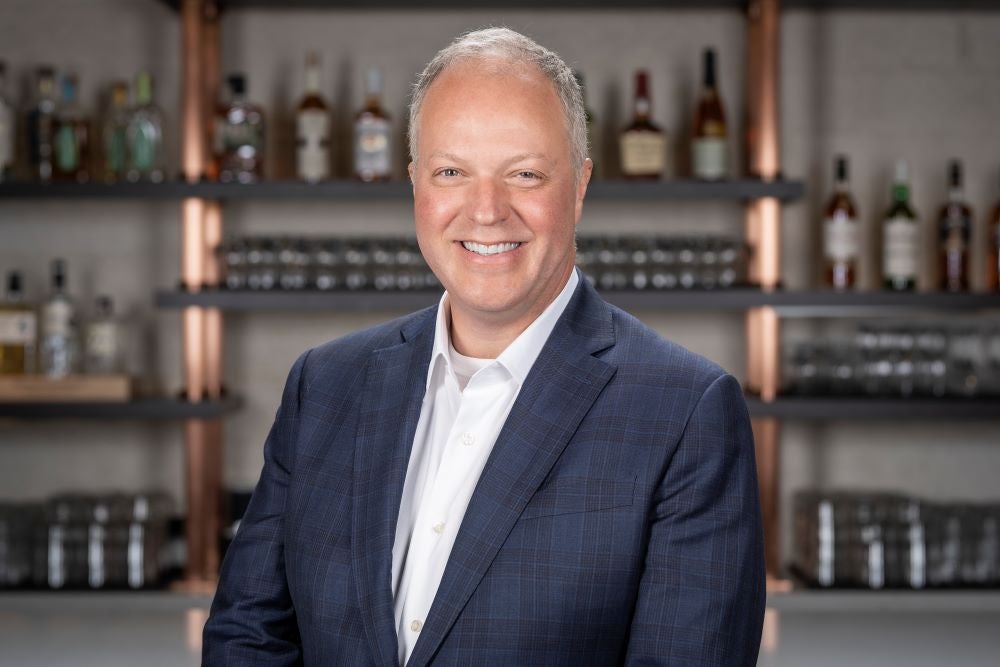
JD: What are Beam Suntory’s best opportunities for top-line growth next year?
Greg Hughes: We are seeing growth opportunity for 2024 in line with our premiumisation strategy. There continues to be evidence of premiumisation in alcoholic beverages globally, particularly in spirits and RTDs. While the industry has seen some slowdown in the US, premium+ American whiskey, Tequila and gin are expected to grow single digits. We will also continue to see strong volume growth in India and Asia.
JD: How do you think cost inflation will impact your business in the coming 12 months?
Hughes: According to the Organization for Economic Co-operation and Development (OECD), in 2024 inflation should come back to pre-pandemic levels. While there is still room to increase pricing in some categories and geographies given spirits pricing has not equated to inflation increases, redefining what value means is more critical for our brands. We look to make sure that we leverage our brand equity in iconic brands like Jim Beam, Maker’s Mark and our Japanese whiskies, while at the same time taking into consideration the local market conditions.
JD: How do you see consumer demand across your geographic markets in 2024?
Hughes: Consumer demand for spirits is expected to remain strong in the next year but the degree of price sensitivity will vary across markets. In Europe, where consumers tend to be more price-conscious, we see greater price elasticity. In contrast, some markets are more resilient and less impacted by price and we adjust accordingly. We have a strong portfolio of brands that offers a diverse range of exceptional quality products to consumers, which benefits us as some consumers look for value while others prefer to treat themselves to more premium offerings.
JD: How will your business use AI next year, and do you plan to up investment in the technology?
Hughes: AI and machine learning have always been an integral part of our work, however, in terms of Generative AI, we use it to analyse consumer and market data to identify drivers, optimise promotions, predict demand and manage inventory levels. We believe AI will help us to make better decisions across all aspects of our business, given the speed of delivering tasks and the integration of unstructured information that previously took significant time, which will ultimately lead to increased profitability and market share. There are also benefits in areas like innovation, as well as supply chain and development.
While AI offers significant potential benefits, there are also challenges associated with its implementation. These include the need to harmonise large amounts of high-quality data, the potential for bias in AI algorithms and change management, which are all things we look at carefully as it gets even more integrated into our ways of working.
JD: On which key ESG issues do you expect to increase investment in 2024 and why?
Hughes: Proof Positive is our enterprise-wide sustainability strategy, reflecting our ambitious, long-term commitments to building a more sustainable, equitable future. We continue to accelerate our progress against our three pillars – Nature Positive, Consumer Positive and Community Positive.
We will have a significant focus in 2024 on our Nature Positive pillar, which is critically important to our parent company Suntory Holdings. Our efforts are dedicated to giving back more to nature than we use, with relevant targets including reducing our water use, introducing innovating agricultural practices, driving a charge toward renewable energy, and protecting vital environmental resources.
We are also very focused on reducing harmful drinking and building a responsible culture.
Sylvia Bernard – La Martiniquaise international marketing director
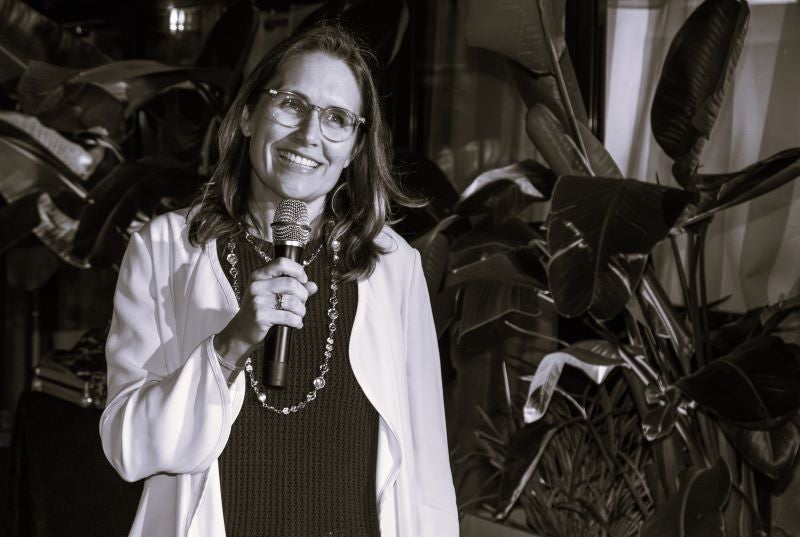
JD: How do you think cost inflation will affect La Martiniquaise in the next 12 months?
Sylvia Bernard: Inflation was a major new challenge in 2022-2023 with unprecedented cost increases and a lot of uncertainty on how the markets and consumers could react to the new prices.
For 2024, the situation looks really complex with costs still increasing or remaining at a historically high level and a strong pressure from the markets to minimise the price increases.
Our strategy will not change: to continue to invest heavily in the energy transition (reducing the use of carbon fuels and producing green energy) and to be the most accurate possible in our price increases to strengthen our relationships with our partners.
JD: How do you see consumer demand across your geographic markets next year?
Bernard: In this turbulent period, there are strong discrepancies between geographic markets. With Scotch being our main category, we see a strong and promising demand in Asia and travel retail, especially in the Middle East.
JD: To what extent do you anticipate some price elasticity in 2024 and how will you react to that?
Bernard: We believe that the long-term trend of premiumisation will continue but that, in the short term, affordability will be a key theme. We need to be very agile and to adapt, which is at the heart of our entrepreneurial culture.
JD: What consumer trends do you expect to drive your innovation and NPD pipeline next year?
Bernard: We have identified a first set of opportunities through the strengthening of at-home cocktail consumption and the development of the RTD and RTS.
On the other hand, there is a desire of the consumer to get a deeper knowledge [on] some brands, along with a demand for premium and rare editions.
These trends open up a fantastic field of expression for brands to offer new experiences. As a producer, we have a very strong local anchoring in the terroirs and have always been committed [to] wine and spirits tourism. We are proud and honoured to welcome 400,000 visitors per year, especially in France mainland and overseas, in Portugal and Scotland.
JD: On which key ESG issues do you expect to increase investment in next year and why?
Bernard: As a family-owned company with a long-term mindset, sustainability has always been at the heart of our development. We believe in circularity and partnerships. For instance, in Martinique, our rum production is totally integrated, [as we grow] the canes, distilling, and ageing our rums on site. We use sugarcane residues as a source of bioenergy and natural fertiliser. We also have a partnership with a leading French green-energy producer. Today, 30% of our investments in our 20 distilleries and seven wine-making centres are aimed at achieving our sustainable development objectives.
At a group level, we want to promote inclusion and diversity, to strengthen our local commitment and always keep our long-term vision.
JD: What are the biggest challenges you think La Martiniquaise will face? Conversely, do you have reasons for optimism in 2024?
Bernard: In this unpredictable period, we need to be long-term driven but agile. We will have to maintain the attractiveness of our brands despite the price increases, through continuous investments [in] our leading mainstream brands.
La Martiniquaise has the advantage [of having] a very balanced portfolio with brands positioned from access to premium and covering all [drinks for social occasions.] We can also capitalise on high-performance production facilities for all our sites thanks to regular investments over the [past] decades.
With the commitment of our associates, we are confident that our group is well prepared to head into 2024 with a strong resilience on our European markets and a great international development, in an inspiring sector.
Bob Kunze-Concewitz – Campari Group CEO
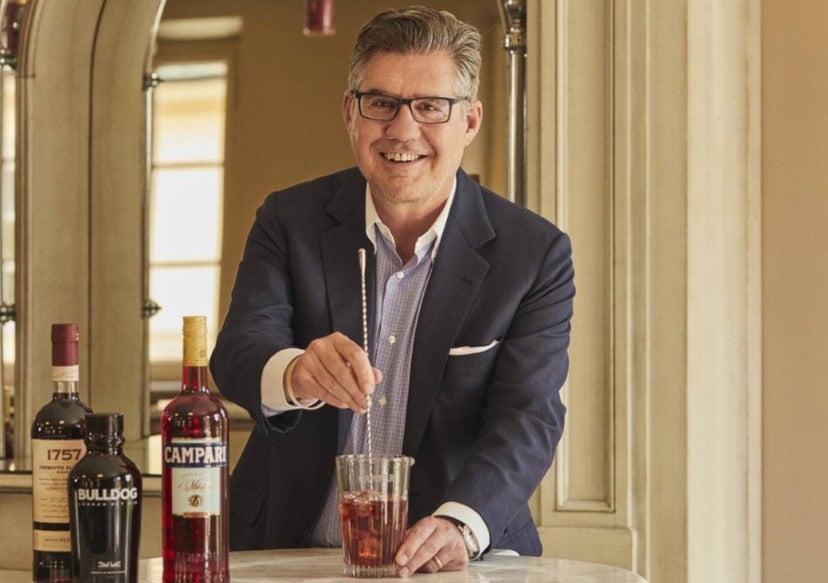
JD: What are the company’s best opportunities for sales growth in 2024?
Bob Kunze-Concewitz: Looking into the first nine months of 2023, we are proud of our continued strong performance determined by a solid brand momentum across key categories: aperitifs, Tequila, and bourbon.
We aim to continuously raise the bar and leverage our strong brand equities. We expect continued growth in aperitifs, rum, Tequila, and Bourbon leveraging on the strength of our portfolio, which is made of some of the most admired brands in the spirits industry.
Furthermore, our long-term investment in the aperitifs plant in Novi Ligure, in distilling in Kentucky and the Espolon distillery in Mexico will provide us with additional capacity enabling us to meet increased consumer demand for our brands.
JD: How do you see consumer demand across your geographic markets next year?
Kunze-Concewitz: If we look at the drivers of choice in consumer behaviour, we see that more and more consumers are leaning toward quality over quantity. Therefore, we expect that consumers will continue to allocate their disposable income to the purchase of quality products. Our key brands are seen as an ‘affordable luxury’ with which consumers will still reward themselves.
JD: In which markets do you see the best opportunities for growth for your business and category?
Kunze-Concewitz: Considering that we are outperforming our reference markets across regions, we believe that we have many opportunities worldwide, especially regarding aperitifs, Tequila, and Bourbon.
It is worth mentioning our growth strategy in Asia Pacific where, beyond a significantly strengthened route to market across the region, we recently announced the signing of a memorandum of understanding on strategic cooperation with [baiju distillery] Wuliangye. The collaboration will actively explore product innovation, brand marketing and other aspects, to jointly improve the performance of the respective brands in the global market, including China, and create new ideas and models for spirits cooperation between the East and the West.
JD: Campari Group recently struck a deal to buy Courvoisier Cognac. How does the company plan to grow the brand in the US in 2024, given the drop in consumer demand seen this year?
Kunze-Concewitz: The acquisition of a premium, top-four, historical Cognac house, Courvoisier, with great latent equity and highly acclaimed expressions, is a perfect fit with our strategy and a rare and unique opportunity to expand our premium spirits portfolio and enter the cognac category.
Looking at the US market, Cognac remains one of the spirits industry’s most successful categories, with current levels that are still above pre-pandemic in terms of value and volume. Despite the entire category being impacted by destocking following strong pandemic-induced growth, also amplified by inflationary circumstances, US structural premiumisation trends in the industry will continue to drive the long-term prospects of the category, supported by its scarcity value and superior liquid quality.
JD: What are the biggest challenges you think the company will face next year?
Kunze-Concewitz: In 2024, we expect our markets to be impacted by the prolonged challenges brought about by the volatile macro-environment, geopolitical uncertainty as well as and tepid overall consumer demand.
JD: Do you have reasons for optimism in 2024?
Kunze-Concewitz: We remain confident to continue outperforming our markets and delivering solid organic topline growth thanks to the strength of our key brands. Concomitantly, margins are expected to reflect the full-year effect of 2023 positive pricing, sales mix linked to business seasonality, the normalisation of input costs inflation as well as the continued investments to strengthen the group’s commercial capabilities.
Lawson Whiting – Brown-Forman president and CEO
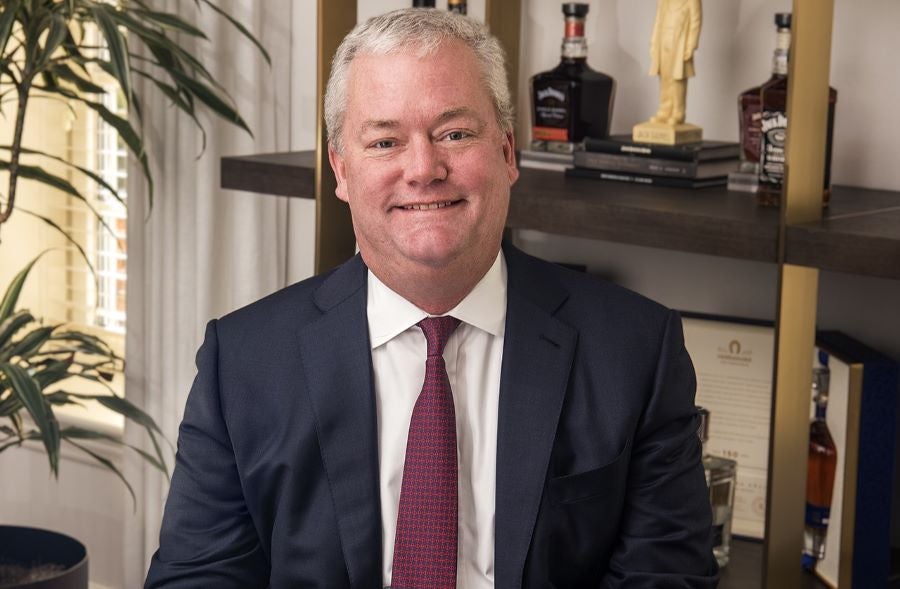
JD: Do you expect Brown-Forman to see volume growth next year?
Lawson Whiting: We are set up for solid growth given the work we’ve done in reshaping our portfolio to focus on premium and super-premium brands, and the investments we’ve made in our brands and route to consumer.
Two recent examples of our portfolio reshaping are the additions of Gin Mare and Diplomatico rum, both super-premium brands with large presences outside of the US. We’re starting to see beneficial contributions from both brands and foresee long runways for global growth.
It was just a year ago that we launched the iconic Jack & Coke cocktail as a branded, ready-to-drink, adult beverage in Mexico. Since then, we have expanded Jack & Coke into 13 markets, most recently Germany, which launched in September 2023. We are planning to be in 30 markets by the end of 2024.
In addition, we believe we have now moved beyond the disruptions of the last several years, including the difficult comparisons from this time last year for brands such as Jack Daniel’s Tennessee Whiskey, Jack Daniel’s Tennessee Honey, Herradura, and Woodford Reserve. As we look toward 2024, we believe that these brands will again be meaningful contributors to our growth.
JD: How do you think cost inflation will affect Brown-Forman in the coming 12 months?
Whiting: We believe inflation will likely continue to negatively affect costs. However, these costs will be partially offset by the absence of [expenses] associated with supply chain mitigation.
Looking forward, input cost trends seem to be moving in a more favorable direction, particularly for agave. We are encouraged that agave prices are finally on a downward trajectory, which should help to improve our margins.
We will continue to focus on the execution of our long-term pricing strategy and believe we are in a strong position given the strength and relevance of our brands and our continued brand-building investments.
JD: How do you see consumer demand across your geographic markets next year?
Whiting: Globally, consumers continue to seek affordable luxuries, such as premium wines and spirits, while also seeking affordability. We are still seeing consumer demand for premium and super-premium spirits and expect consumer demand for our brands to continue to reflect a normalisation back to our more historical trends, particularly in the US.
In 2023, we saw some exciting areas of increased consumer demand, including in South Korea, where we had a very strong launch of our Jack Daniel’s Tennessee Apple. Another bright spot was Brazil, where we continue to see solid consumer demand across the Jack Daniel’s family of brands.
JD: In which markets do you see the best opportunities for growth for Brown-Forman?
Whiting: The US remains the most profitable spirits market in the world, and we continue to believe Brown-Forman has the right portfolio of premium and super-premium brands to capitalise on the long-term growth potential of the market.
At the same time, we continue to see faster growth outside of the US. We see long-term growth potential in many developed markets, such as Germany, Australia, the UK, and Japan. This is particularly true with the addition of Gin Mare and Diplomatico, both of which have a strong presence in Europe.
Our emerging international markets continue to lead the company’s growth, collectively delivering very strong double-digit organic net sales growth. We see Jack Daniel’s Tennessee Whiskey performing well in these markets, particularly Turkey, Poland, and Brazil.
JD: Is Brown-Forman planning to use or up its investment in AI next year?
Whiting: Like many organisations, we have used AI for years in a variety of ways to help enhance efficiency and effectiveness. We’ve taken a strategic step of establishing an AI centre of excellence to spearhead the development and usage of AI technologies. While much remains unknown, we can envision AI making operations more efficient, improving employee experiences and productivity, and making us more agile and competitive.
It’s worth noting that regulations and laws governing AI are still evolving and much is still to be learned. It is important to us that we have robust governance policies that can protect against potential risks and maintain the trust of our stakeholders.


